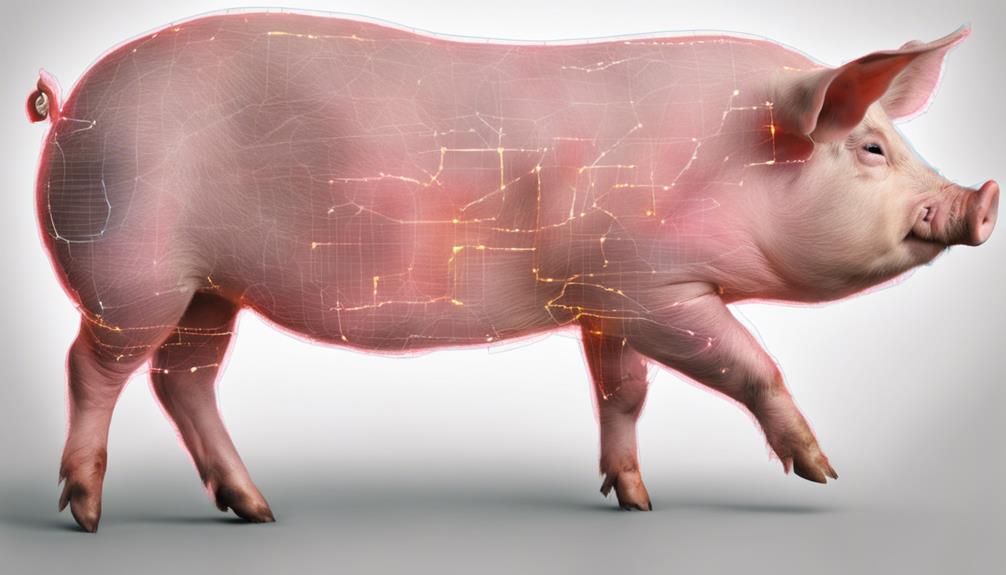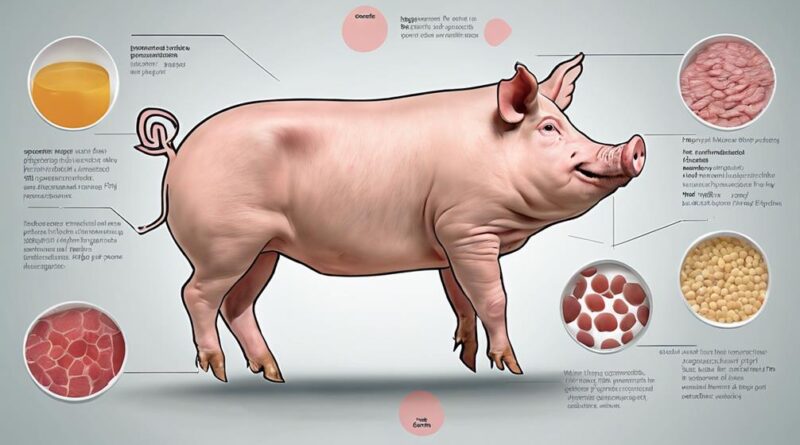7 Key Roles Genetics Play in Pig Nutrition
Genetics subtly guide various aspects of pig nutrition, influencing growth rate, feed efficiency, nutrient utilization, muscle composition, fat deposition, disease resistance, reproductive performance, and overall health.
Understanding these genetic roles can lead to significant improvements in pig farming practices.
As you explore the intricate ways genetics impact pig nutrition, you will uncover the vital importance of considering these factors in optimizing pig health and production outcomes.
Influence on Growth Rate
Genetics significantly impacts the growth rate of pigs, directly influencing their development and overall productivity. Hormonal regulation plays a crucial role in this process. Certain genetic traits can affect how efficiently pigs produce and respond to growth hormones, ultimately influencing their growth rate. For example, variations in genes related to insulin-like growth factor 1 (IGF-1) can impact how effectively pigs utilize growth hormones to promote muscle growth and overall development.
Metabolic pathways also play a vital role in determining the growth rate of pigs based on their genetics. Different genetic variations can influence how pigs metabolize nutrients, such as carbohydrates, fats, and proteins. These variations can impact the efficiency of energy production and utilization within the body, directly affecting the pig's growth rate. For instance, genetic differences in enzymes involved in nutrient metabolism can alter how efficiently pigs convert feed into muscle mass or fat.
Understanding the intricate interplay between genetics, hormonal regulation, and metabolic pathways is essential for optimizing the growth rate of pigs. By selecting for favorable genetic traits that enhance hormonal responses and metabolic efficiency, pig producers can improve growth performance and overall productivity in their herds. It highlights the importance of genetic selection and breeding strategies aimed at enhancing growth traits to meet the demands of the swine industry efficiently.
Impact on Feed Efficiency
When considering pig nutrition, the genetic makeup of the animals plays a crucial role in determining their feed efficiency. Genetic selection has a significant impact on how efficiently pigs convert feed into body mass. Through selective breeding, farmers can choose pigs with genetic traits that enhance feed efficiency, leading to more economical and sustainable pig production practices.
Metabolic pathways within the pig's body are influenced by its genetic makeup, affecting how efficiently nutrients are utilized. Genetic variations can impact nutrient absorption, digestion, and utilization. Pigs with favorable genetic traits can extract and utilize nutrients from feed more effectively, resulting in improved feed efficiency.
For instance, genetic selection can favor pigs with a higher capacity for converting feed into lean muscle mass rather than fat, thereby increasing feed efficiency. These genetic variations can also influence how pigs process different nutrients, such as amino acids, fats, and carbohydrates, further impacting feed efficiency.
Role in Nutrient Utilization
Optimizing nutrient utilization is essential for maximizing pig growth and health. Genetics play a crucial role in determining how efficiently pigs digest and utilize nutrients through metabolic pathways. Understanding this genetic influence can help in developing tailored nutrition strategies for improved pig performance.
- Digestive Efficiency: Genetics influence the structure and function of the pig's digestive system, impacting how effectively nutrients are broken down and absorbed.
- Metabolic Pathways: Genetic variations can affect the efficiency of metabolic processes involved in nutrient utilization, such as energy metabolism and nutrient partitioning.
- Nutrient Absorption: Genetic factors can determine the pig's ability to absorb specific nutrients from the diet, affecting overall nutrient utilization and growth.
- Feed Conversion: Genetic differences can influence how efficiently pigs convert feed into body mass, impacting growth rates and feed efficiency metrics.
Contribution to Muscle Composition
Understanding how genetics influences nutrient utilization in pigs extends to its significant role in determining muscle composition. Muscle development in pigs is heavily influenced by genetics, impacting the rate of protein synthesis and the overall muscle growth potential. Different pig breeds have varying genetic predispositions when it comes to muscle composition, affecting qualities such as muscle fiber type, distribution, and overall muscle mass.
Genetics play a crucial role in regulating the expression of genes involved in muscle development and protein synthesis. Certain genetic variations can enhance the efficiency of protein synthesis, leading to increased muscle growth and development. Pigs with favorable genetic traits for muscle composition tend to have higher lean muscle mass and improved meat quality compared to those without these genetic advantages.
Moreover, genetic factors can influence the composition of muscle fibers in pigs. Some breeds are genetically inclined to have a higher proportion of fast-twitch muscle fibers, which are responsible for explosive movements and strength. On the other hand, other breeds may exhibit a higher ratio of slow-twitch muscle fibers, contributing to endurance and sustained activity.
Effects on Fat Deposition
Genetics significantly influence how fat is deposited in pigs, impacting their overall body composition and fat distribution. This intricate process is regulated by various biological mechanisms, such as hormonal regulation and metabolic pathways.
Understanding how genetics influence fat deposition is crucial for optimizing pig nutrition and production. Here are some key points to consider:
- Hormonal Regulation: Hormones play a crucial role in signaling the body to store or release fat. Genetic variations can affect the production and sensitivity to hormones like insulin, leptin, and cortisol, which in turn influence fat deposition.
- Metabolic Pathways: Genetic factors can impact the efficiency of metabolic pathways involved in fat synthesis, storage, and breakdown. Variations in genes related to lipid metabolism can lead to differences in fat deposition among pigs.
- Adipose Tissue Distribution: Genetics can determine where fat is primarily stored in the body. Some pigs may have a genetic predisposition to deposit fat more in subcutaneous tissue, while others may accumulate more visceral fat.
- Fat Quality: Genetic factors can also influence the composition of fats deposited in pigs. Variations in genes related to fatty acid synthesis and desaturation can affect the quality of fat, impacting meat quality and health aspects.
Understanding these genetic influences on fat deposition can help in designing tailored nutritional strategies to optimize pig growth, meat quality, and overall health.
Relationship With Disease Resistance
How does the genetic makeup of pigs influence their ability to resist diseases?
Genetic diversity plays a crucial role in determining the immune response of pigs. Pigs with a diverse genetic background are more likely to exhibit a broad immune response, enabling them to combat a wider range of pathogens effectively. This diversity allows for a stronger defense mechanism against diseases, ultimately leading to better overall health and reduced susceptibility to infections.
Moreover, certain genetic traits can directly impact the immune response of pigs. For instance, some genetic variations can enhance the production of specific antibodies or cytokines that play key roles in fighting off infections. These genetic factors contribute to the overall robustness of the pig's immune system, making them more resilient to various disease challenges.
Connection to Reproductive Performance

The genetic makeup of pigs not only influences their ability to resist diseases but also plays a significant role in their reproductive performance. When it comes to the connection between genetics and reproductive performance in pigs, both maternal genetics and paternal genetics are key players in determining fertility and sperm quality, respectively.
- Maternal Genetics and Fertility: The maternal genetics of a pig can impact its fertility rates. Certain genetic factors inherited from the sow can influence the pig's reproductive capabilities, affecting aspects such as ovulation, conception, and overall litter size.
- Paternal Genetics and Sperm Quality: On the other hand, paternal genetics play a crucial role in determining sperm quality. The boar's genetic composition can affect the viability, motility, and morphology of the sperm, directly impacting fertility rates and successful conception.
Understanding how maternal genetics influence fertility and how paternal genetics affect sperm quality is essential for breeding programs aimed at improving reproductive performance in pigs. By selecting breeding stock with optimal genetic traits related to fertility and sperm quality, pig producers can enhance the reproductive efficiency of their herds, leading to increased productivity and profitability in the long run.
Influence on Overall Health
Optimizing the genetic traits of pigs can significantly enhance their overall health and well-being. Genetics play a crucial role in shaping the immune system and gut health of pigs. When selecting pigs with superior genetic traits, you're essentially choosing animals with a stronger immune system. This means they're better equipped to fight off diseases and infections, leading to overall improved health and reduced need for antibiotics.
Furthermore, genetics also influence gut health in pigs. Pigs with favorable genetic traits tend to have a more robust gastrointestinal system, which contributes to better nutrient absorption and overall digestive health. A well-functioning gut is vital for pigs to thrive and reach their full growth potential.
Frequently Asked Questions
How Do Genetics Influence the Pig's Ability to Convert Feed Into Muscle Mass?
When it comes to how genetics impact a pig's ability to convert feed into muscle mass, it's all about growth efficiency and genetic factors.
The way a pig metabolizes nutrients and converts them into muscle is influenced by its genetic makeup. Certain hereditary traits can affect feed conversion rates, ultimately determining how efficiently a pig can turn its feed into muscle mass.
Can Certain Genetic Traits Impact the Pig's Susceptibility to Specific Diseases?
Certain genetic traits can impact a pig's susceptibility to specific diseases. Genetics play a key role in determining genetic susceptibility and disease resistance.
Pigs with favorable genetic traits may exhibit a higher resistance to certain diseases, while others with less favorable genetics may be more susceptible to infections or illnesses.
Understanding the genetic makeup of pigs can help in breeding practices and management strategies to improve overall health and disease resistance in pig populations.
Is There a Link Between Genetics and the Pig's Reproductive Success?
When it comes to genetics, your pig's reproductive success can be influenced. Genetics play a crucial role in determining how efficiently your pigs grow.
How Do Genetics Play a Role in Regulating the Pig's Metabolism and Overall Health?
Genetic regulation influences how your pig's metabolism functions, impacting their overall health. Different genetic factors can affect how efficiently your pig processes nutrients and energy, which in turn can influence weight management and overall well-being.
Can Specific Genetic Factors Affect the Pig's Ability to Efficiently Utilize Nutrients in Feed?
When it comes to nutrient absorption, genetic variation can definitely influence a pig's ability to efficiently utilize feed. Genes play a crucial role in digestive efficiency, impacting how nutrients are absorbed and used by the body.
Depending on gene expression, some pigs may have a higher capacity to extract and process nutrients from their feed compared to others. This genetic factor can significantly affect overall health and growth in pigs.
Conclusion
So there you have it, genetics play a crucial role in pig nutrition. From influencing growth rate and feed efficiency to muscle composition and disease resistance, genetics impact various aspects of a pig's health and performance.
By understanding and leveraging the genetic traits of pigs, farmers can optimize their nutrition programs to improve overall health, productivity, and profitability.
So, next time you're planning your pig's diet, remember the importance of genetics in achieving optimal results.
